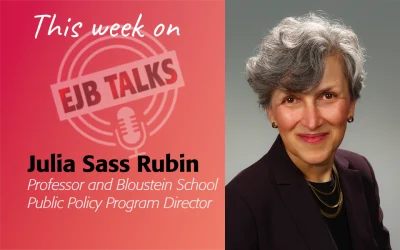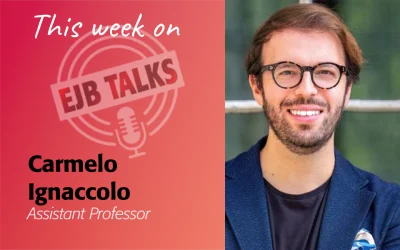This season, Stuart Shapiro has invited our newest faculty members to share their research on EJB Talks. In this episode, the last in this series of seven, he welcomes Professor of Public Policy, Jermaine Toney, who studies the relationship between race, family wealth, parental income, and the income and prosperity of future generations. Professor Toney discusses the importance of understanding the past and the current systematic gaps that still weigh on Black households and talks about developing policy solutions for these inequalities.
Stuart Shapiro
Welcome to EJB Talks. I’m Stuart Shapiro, the Associate Dean of Faculty at the Bloustein School, and the purpose of this podcast is to talk with my colleagues and our alumni about policy, planning, and health, the interaction between these issues and how they affect people in New Jersey, the United States, and the world.
This week, we conclude our tour of the new Bloustein School faculty that has begun our podcasts’ second season. Today I’m speaking with Professor Jermaine Toney, who teaches in the program nearest and dearest to my heart, the Public Policy Program. Professor Toney, welcome.
Jermaine Toney
Thank you so much, Stuart. It’s great to be here. Pleasure.
Stuart Shapiro
Excellent. Well, let’s start, we’ll talk about your research. It looks at the wealth gap between the races and I’d like to know how you became interested in this subject.
Jermaine Toney
I became interested in this subject working with mentors. You know, wealth is not a conventional quality of life indicator. You know, yet it’s so important. So the normal conventional indicators are educational attainment, household income homeownership. And so I met… I started working on this subject through mentors. I met Darrick Hamilton, when I was at the New School, I did an independent study with him. I met Sam Myers, who’s a professor at the University of Minnesota. And I was working as a lead researcher with a nonprofit organization there connecting policy analysis with community-based organizations and policymakers. And he invited me onto a project looking at…. that explored racial bias and mortgage and small business loan denial rates in the Twin Cities. And this work was actually recently profiled in US News and World Report as the context for the George Floyd protests.
So both of them, Sam and Darrick, are trained as economists and encouraged me to get a doctorate in economics. They both served on my dissertation committee, and that’s where I started exploring these structural factors related to the wealth gap, the role of financial institutions, and the role of who was born in your family, your extended family, your kin networks.
Stuart Shapiro
So many people in our audience probably understand the difference between income and wealth, but some may not and some may conflate the two. Can you explain the difference and why wealth is important?
Jermaine Toney
Yes. Generational wealth matters. Wealth is distinct from income. Income, you can think of it as a flow of resources. Say you get a paycheck from employment, or maybe you earn interest from your bank account. While wealth is a stock of resources built from possessing assets. So stocks, savings, homeownership. And here’s where generational wealth matters. Wealth, more than income, can be used to invest in appreciating assets. For offspring such as college education, unpaid internship in a high rent city, starting a new business, buying a property in a better residential neighborhood. Without these wealth transfers, regardless of income, these assets are just much harder to attain.
Stuart Shapiro
I love the stock and flow analogy. And I think that hits the nail on the head there, that wealth is your stock of assets, whereas income is the flow coming into your assets. And you know, there’s also a flow going out and if that matches the income, then you don’t accumulate wealth. And that’s the situation many people find themselves in. Indeed, you found a relationship of a sort, of intergenerational wealth. You’ve alluded to it a couple of times. How does wealth in one generation affect income and wealth in the following generation?
Jermaine Toney
Parental income is highly predictive of children’s income. So that’s the income to income transmission. There’s also research that looks at the wealth of the parental generation and how that is transmitted to the adult child generation. So that’s the wealth, the wealth connection. Less focus is on how the income of the younger generations is influenced by the wealth of the previous generations. Here, there’s one sort of one study that I’m building upon, and that’s that parental wealth can prepare children to have income above their parents’ income position. But homeownership, parental homeownership, in particular, contributes to an even larger proportion of children that have income above their parents’ income position.
But the pursuit of income, the pursuit of wealth accumulation, may not be entirely confined to individual efforts and parents alone. So it may also depend on grandparent wealth. And this is where I’m building on previous research, I’m finding that grandparental wealth, the paternal and the maternal side lineages, are highly predictive of highly correlated, positively correlated, strongly correlated with the third generations income mobility.
Stuart Shapiro
So this, you know, let’s talk a little bit about the mechanism. It makes sense to me that would happen intuitively, but let’s talk about the mechanism that that happens by. Is that parental and grandparental wealth can pay for a college education, which then increases income for the following generations? Is it that they can put a down payment on a house for someone? How do you think this actually happens?
Jermaine Toney
You alluded to it. Two concepts to think about. One is family insurance, and two is investment. Extended family wealth, so it’s parental/grandparental wealth, can be used to secure income, say, during… if the offspring is facing employment gaps, or facing financial hardships, which is a direct form of family insurance.
Now, with regards to investment, parental and grandparental wealth can be used to help the child with homeownership acquisition, pay for higher educational attainment, and stopped by investing in stocks, which all of them later improve offspring with third generations income and wealth prospects.
Stuart Shapiro
Now, one of the fascinating aspects of your work is how this relationship between wealth and income leads to an increase in racial disparities that get worse over time. Can you talk a little bit about that?
Jermaine Toney
Yes, as I look at income at life events, these life events represent all these various ways that parental and grandparental wealth can drive mobility and also inequality. I find that a rise in median income is associated with advancement in life events. So, you know, when you’re forming your own household, your income is quite low, it starts to rise. When you become a first-time homeowner, it rises again. When you start to complete your college education… It rises again gently when you enter your first marital union, and when you have your first newborn child. And it peaks around when you turn 40 years of age.
Aligned with these life events is the Black-White gap in median income. When White children are forming their own household and becoming a first-time homebuyer, Black households possess 6 and 7 cents respectively, for every dollar earned by White households. When Blacks complete a college education, and into their first marriage, they hold around 7 and 8 cents respectively, for every dollar amassed by Whites. When Whites are having their first newborn child and turning 40 years of age, Blacks possess 5 cents for every dollar earned by Whites. And so these life events represent all these ways that parental and grandparental wealth can drive income mobility. What we’re seeing, you see the disparities are growing over time, and this is very much stemming from just the accumulation of advantages that come from extended family wealth from parents and grandparents.
Stuart Shapiro
Yeah, that’s very sobering in terms of the gap that we need to overcome and how big a job is ahead of us. I mean, just to sort of put this in pretty metaphorical terms here, we have long talked about the American dream, and each generation being better off than the one that preceded it. And that seems to work, you’re saying, if we cross a particular wealth threshold; but if we don’t, that’s not true. And am I right in thinking that your work is telling us that the American Dream is not true for a subsection of our population, particularly for racial minorities because of this wealth transference?
Jermaine Toney
The wealth… the American dream… it seems to be a myth. The American reality seems to be that wealth begets wealth, income begets income, wealth begets income. And wealth is likely to be maintained across generations, which is contradicting this idea of an American dream, you can start at the bottom and work up. But if wealth in terms of stocks, non-financial assets like a business, homeownership, components like a savings account, if these are maintained across generations, that leaves a limited ability to, to have mobility, because there’s just this persistence across generations.
Stuart Shapiro
So let’s get to the policy aspect of this. We’ve just lived through a summer where these inequalities have been laid bare both by the pandemic, which has hit minority households much harder than it has hit White households, and through the George Floyd protests, where we see that the racial minorities are being treated differently. If you didn’t know it already, and you probably should have, it’s become even clearer this summer. The distinction there, and clearly part of this is due to this really difficult problem of wealth transference across generations. What do we do from a policy perspective? What can we… what kind of policies can we look at, to deal with these problems?
Jermaine Toney
Solutions are being proposed, elected leaders…. are taking leadership to address wealth disparities. But as you mentioned, there’s this… wealth is being transferred across generations. The current wealth disparities we’re seeing now are decades and decades in the making. So policy solutions won’t fix this overnight. But, so we’re in a pandemic recession, that is pulling more Americans into unemployment, without regular paychecks without health insurance, and it’s pulling kids right along with them, and exposing many people to financial fragility. I find that there is a solution being proposed, and that’s around something called baby bonds, baby bond policies.
Stuart Shapiro
Yeah. Cory Booker has been a leading voice for that, right?
Jermaine Toney
That’s right. So and Cory Booker, and then there’s also been one proposed by the New Jersey Governor. They’re trying to… the idea is that trying to remove barriers to wealth for low-income households. So there’s a proposed bond for a modest amount for children, that they can use the proceeds when they turn 18 to pay for college, purchase a home, start a business. Maybe they’ll continue to continue to invest and use the proceeds later, but I think this is a movement in the right direction for smart long-term investment.
Stuart Shapiro
Am I off base though in thinking we also need to reverse some of the repeals of our more progressive taxation policies that were in place for a long time that we have cut back on? It seems to me that if wealth transference is a problem, part of policies role is to facilitate that wealth transference, and taxation is probably the most frictionless mechanism by which to do so.
Jermaine Toney
Yes, that’s also a route, repealing, taxing wealth, making it come to the public coffers, and being able to redistribute it. I think that’s also an important route. I’m a longitudinal researcher, and so I’m aware of wealth data, you know, at the national surveys on wealth…so a survey of income and program participation, national youth longitudinal survey panel study of income dynamics… specific data collected on New Jersey residents or Minnesota residents, there are some gaps there. And so there’s probably more room for collecting wealth data, on particular segments of the population by state. And so, if we’re trying to fix wealth disparities, I think it’d be important to actually collect data, observe it, so we can see the disparities.
Stuart Shapiro
That leads me nicely into our last question. What projects do you see yourself moving into over the next several years around these issues?
Jermaine Toney
I’ve been very encouraged by the social movements that emerge in the wake of the pandemic recession and the police killing of George Floyd. These movements have placed a spotlight on disparities in employment, income, wealth, access to credit, mass incarceration, media representation. I want to build on my work in the Twin Cities. I’ve just been invited on to a project that’s looking at disparities in loan denial rates in the Twin Cities. Again, the George Floyd protests have brought just renewed attention to these issues. So I’m working on a study that will examine different components of disparities and loan denial rates.
So this is from the mortgage, small business. So (A) the standard demographic property loan characteristics, (B) census track redlining, from the 1930s and 40s. And there are these maps that [Jason] Corburn [UC-Berkeley] was talking about yesterday, about these maps that are being revealed out of Virginia that allow you to look at a map and look at the red linings in the New Deal. The maps that we’re helping to promote redlining. There’s red districts or don’t loan there; yellow district, loan there but with caution; so I want to integrate those. So census tract, redlining, from the 1930s and 40s, census tract, yellow lining in ethnicity of a neighborhood from the 1930s and 40s. I understand there was quite a bit of antisemitism in the real estate, industry in Twin Cities. And I also want to look at what we can learn from the location of riots in the 1960s in the Twin Cities in Minneapolis and St. Paul.
Stuart Shapiro
So one, definitely your work really highlights the fact of how both policy choices and behaviors can have repercussions that echo through the generations, and I really think that that’s a valuable contribution. Thank you for coming on today and talking about these issues with us.
Jermaine Toney
Oh, my pleasure. Great to be here Stuart, thank you.
Stuart Shapiro
A big thank you as well to our production team, Amy Cobb and Karyn Olsen. We’ll be back next week with another talk from another expert from the Bloustein School. Until then, stay safe and make sure you vote.




